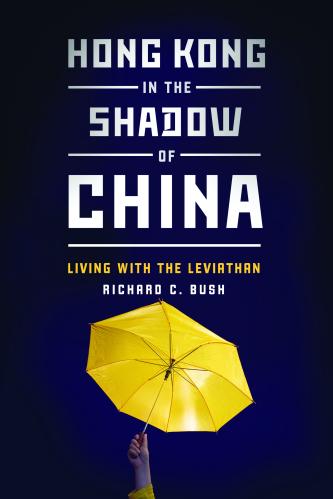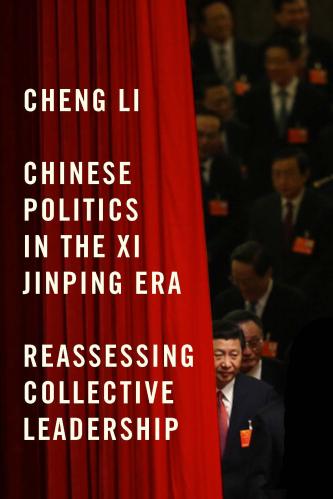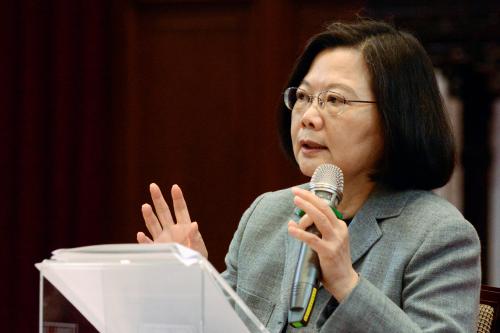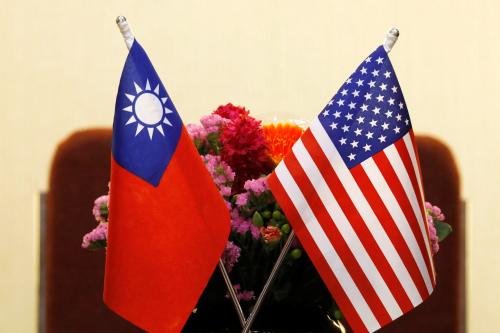After Taiwan’s local elections on November 24, 2018, in which the ruling Democratic Progressive Party (DPP) lost a number of mayor and magistrate positions, there was increased finger-pointing in the party. People in the base of the DPP, the so-called “Deep Greens,” criticized President Tsai Ing-wen, the party’s leader, for having been insufficiently aggressive in pursuing their agenda of resisting China and taking steps toward de jure independence for Taiwan. Deep Green politicians formed groups to pressure President Tsai to move in their policy direction. At stake is not only the DPP’s policy and ideological direction but the face it presents to the voters in presidential elections that will be held in January 2020.
One of these activists is Kuo Pei-hung, who is chairman of pro-independence Formosa TV. With a number of like-minded colleagues, he has formed the Formosa Alliance (literally “Joyful Alliance” in Chinese) to promote a Deep Green agenda and specifically to liberalize the use of referendums. Currently, the requirements for holding referendums on domestic policy issues are relatively modest, but more restrictive regarding questions of Taiwan’s sovereignty and, by implication, its relationship with China. The open letter below to Mr. Kuo argues that such an effort would, if successful, have significant implications for the United States.
I have read the statement that the Formosa Alliance released on January 31 and your own related press statement in which you say that “Taiwan next year should create in independent state and advance towards being a normal country.” You wish to amend the referendum law to make it easier to have a popular vote on these issues. But given China’s clear opposition to an independent Taiwan and the position of the United States that it does not support Taiwan independence, the Alliance’s proposals are certain to stimulate controversy.
It is probably not appropriate for me to comment on the substantive wisdom of the Formosa Alliance’s proposal. It is up to people in Taiwan to render a judgement on ideas such as making Taiwan a “normal country” through a referendum.
Yet on two aspects of your proposal, I believe it is proper for me to offer my views for your consideration. The first aspect is that the proposal touches on the national interests of the United States, specifically its abiding interest in peace and security in the Taiwan area and its longstanding view that neither side of the Taiwan Strait should try unilaterally to change the status quo. One reason for this American policy, of course, is that the People’s Republic of China holds that Taiwan is a part of China, and Article 8 of its 2005 Anti-Secession Law authorizes the use of “non-peaceful means” to respond what it regards as a Taiwan move on towards “secession.”
Now I know that you reject China’s claim concerning the legal status of the territory of Taiwan, but that happens to be its formally held position. Also, neither you nor I can control how the Beijing government interprets developments on Taiwan and whether they trigger Article 8 of the Anti-Secession Law. I’m sure you agree with me that a war in the Taiwan Strait, however it began, would be a tragedy for the island and for all that its people have achieved.
If China were to use “non-peaceful means” in response to what it concluded was secession by Taiwan, that in turn would raise the at least implied commitment of the United States to come to Taiwan’s defense. Yet that commitment has never been absolute. If the men and women of the U.S. armed forces are to risk their lives for the safety of Taiwan, American leaders would want to be certain that such a sacrifice was clearly necessary in light of U.S. interests. At a minimum, U.S. leaders would insist, if actions by Taiwan created the risk of war and might trigger American intervention, that they be consulted in advance by the Taiwan authors of those actions. I wonder, therefore, whether you have thus consulted with anyone in authority in the U.S. government about the risks that your proposal might create. Or do you assume that the Trump administration’s support for Taiwan is so strong that it will support initiatives from Taiwan that might create the risks of conflict?
Of course, the United States and Taiwan have been in this situation before. The Eisenhower administration worried that the defense treaty it concluded with Taiwan in 1954 might induce adventurist actions by Chiang Kai-shek, and so it insisted that Taipei get American approval before it undertook any major military action against the mainland. More recently, President Chen Shui-bian undertook initiatives regarding Taiwan’s legal and political character. He proposed using the mechanism of referendum on issues that concerned Taiwan’s sovereignty. He did not consult with the George W. Bush administration in advance because he knew in advance the answer he would get.
These initiatives did great damage to U.S.-Taiwan relations. You will recall that President Bush publicly criticized Mr. Chen in December 2003 for trying to unilaterally change the status quo. In September 2007, then-Deputy Assistant Secretary of State Thomas Christensen warned that Mr. Chen was putting Taiwan’s security at stake for the sake of the DPP’s electoral advantage. If Mr. Chen assumed that he would have U.S. support whatever he did, he was badly mistaken.
One of the reasons that the United States has expressed support for President Tsai and her administration is precisely because she is cautious and careful.
In my view, one of the reasons that the United States has expressed support for President Tsai and her administration is precisely because she is cautious and careful. She does not take the U.S. commitment for granted and understands the value of close communication.
I do not know how firm the Trump administration’s commitment to Taiwan’s defense would be if military conflict were likely. There are certainly those who see Taiwan as a useful asset in its campaign to resist what they regard as China’s revisionist objectives. But valuing Taiwan’s partnership in this way is not the same thing as giving Taiwan, or political forces in Taiwan, a green light to act unilaterally to change the status quo, a principle that remains a central element of U.S. policy.
I do know that President Trump himself is skeptical about any U.S. security commitment to Taiwan. At a meeting of the National Security Council on January 19, 2018, Mr. Trump asked his senior national security team, “even more than [Korea], what do we get from protecting Taiwan?” The implication of that question is the U.S. commitment to Taiwan is not justified, as far as he is concerned. I have seen no evidence that this skepticism has changed. It is consistent with his long-standing opposition to U.S. defense commitments to U.S. friends and allies.
Secondly: I said that I would not comment on the specific substance of your proposal and I have not done so. But I do believe I have the right to speak on Taiwan’s democratic system generally. That is because I worked with the late Representative Steve Solarz from 1983 to 1992 to promote democracy and human rights on the island. For example, I spent September 28, 1986 drafting and getting approval of a letter by Rep. Solarz, Rep. Jim Leach, Senator Claiborne Pell, and Senator Edward Kennedy urging President Chiang Ching-kuo not to crack down on the newly announced Democratic Progressive Party.
When it comes to democratic mechanisms, none is perfect in my view. Whether it is indirect democracy in a legislature or direct democracy through a referendum, distortion and manipulation of the popular will occurs. So a referendum is not necessarily better than other mechanisms.
If referendums are to be employed on routine policy issues, in my view, they should be crafted in a way so the result truly reflects the view of the majority of all citizens. I’m not sure one can say that about the referendums that were held on November 24 last year.
All the more so when the referendum is on questions regarding the fundamental identity of a state and a nation. For these, it is a good thing to set a high bar for authorizing a referendum and passing a referendum. The stakes are so high and the consequences of being wrong are so great, that it is appropriate—even mandatory—to require a broad public consensus through a super-majority for passage. Witness the trouble that Great Britain is now in because only a simple majority of those voting for Brexit was required for passage.
Thank you for your consideration. I look forward to receiving any response you may have.
Richard Bush
The Brookings Institution







Commentary
An open letter to Mr. Kuo Pei-hung and his colleagues
February 11, 2019